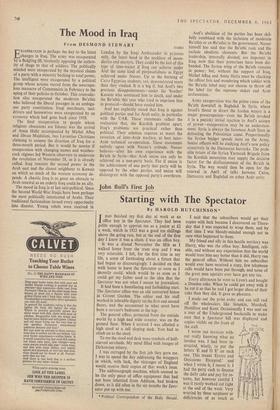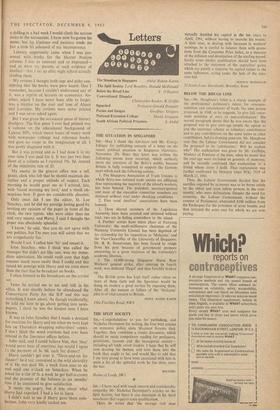John Bull's First Job
Starting with The Spectator
By HAROLD HUTCHINSON* HAD finished my first day at work as an I office boy in the Spectator. They had been polite enough to appoint me as a junior at £2 a week, which in 1923 was a good ten shillings above the going rate, but at the end of the first day I knew it was a sham. I was an office boy.
It was a dismal November the fifth as I walked home from the tram stop and I was very miserable. I felt, for the first time in my life, a sense of foreboding about a future that had begun so discouragingly. I decided on that walk home to leave the Spectator as soon as I decently could, which would be as soon as I could get my father used to the idea that the Spectator was not what I meant by journalism'.
It had been a humiliating and forbidding start. The Spectator office was an old converted house in Covent Garden. The editor and his staff worked in tolerable dignity on the first and second floors, and the accountant in what must have been a servant's bedroom at the top.
The general office, protected from the outside world by a high and wide counter, was on the ground floor. When I arrived I was allotted a high stool at a tall sloping desk. You had to climb on to the stool.
To me the stool and desk were symbols of half- starved servitude. My mind filled with images of Dickensian misery.
I was outraged by the first job they gave me. I was to spend the day addressing the wrappers in which, with luck, the vicarages of England would receive their copies of that week's issue.
The addressograph machine, which seemed to be the only piece of office equipment that had not been inherited from Addison, had broken down, as it did often in the six months the Spec- tator put up with me.
* Political Correspondent of the Daily Herald.
I said that the subscribers would get their copies with luck because I discovered on Thurs- day that I was expected to wrap them, and by that time I was bloody-minded enough not to care what happened to them.
My friend and ally in this hostile territory was Harry, who was the office boy. Intelligent, reli- able, and without any expectation that the world would treat him any better than it did, Harry ran the general office. Without him no subscriber would ever have received a copy, few telephone calls would have been put through, and none of the great men upstairs ever have got any tea.
Every afternoon he went to Lyon's and bought a Dundee cake. When he could get away with it he cut it so that he and I got larger slices of their cake than they did. It gave us pleasure.
I made out the print order and can still reel off the wholesalers like Simpkin, Marshall, Hamilton and Kent. Occasionally I was sent on a tour of the Underground bookstalls to make sure that a Spectator bill was displayed and copies visible on the front of the stall. ePecTATok I wrote out invoices with- out really knowing what an invoice was. I had been in- structed, wisely, to put the letters `E and 0 E' on each one. This meant 'Errors and Omissions Excepted,' and when I wrote it, I meant it. I had the petty cash to finance the daily cake and pay for re- turns, but however careful I was it rarely worked out right at the end of the week. Very worried by these surpluses or deficiencies of as much as a shilling in a bad week I would climb the narrow stairs to the accountant. I have now forgotten his name, but his kindness and patience made me just a little bit ashamed of my 'incompetence.
Literary opportunity came when I was pre- sented with books for the Shorter Notices
column. I was so innocent and so impressed— and so were my parents at such evidence of intellect- -that I sat up after night school actually reading them.
My reviews I thought both sage and pithy con- sidering that the books were pure kapok. One I
remember, because I couldn't understand any of it, was a reprint of lectures on economics. An- other, which I have never been able to forget, was a treatise on the coal and iron of Alsace and Lorraine. My reviews were never printed and I was never asked again. •
But I was given the occasional piece of literary drudgery. The first piece I ever had printed was a column on the educational background of Labour MPs, which meant hours of weary work with newspaper cuttings and reference books. and gave no scope to the imagination at all. I was pretty disgusted with it.
But it was printed and as I had done it in my own time I was paid for it. It was just two lines short of a column so I received I9s. 8d. instead of the minimum rate of £1.
My enemy in the general office was a tall, gaunt, clerk who felt that he should maintain dis- cipline and a proper attitude of respect. Each morning he would greet me as I arrived, late, with 'Good morning my lord,' and a mock ob- sequious bow. It gave me considerable pleasure.
Only once did I see the editor, St. Loe Strachey, and hd did my prestige, lasting good by inviting my opinion of the paper in front of the clerk, the two typists, who were older than me and very snooty, and Harry. I said I thought the paper was absolutely splendid.
`I know,' he said, 'that you do not agree with our politics, but I'm sure you will admit that we are scrupulously fair.'
Would I not. I called him 'Sir' and meant it.
John Strachey, who I think was called the manager but didn't act like one, won my imme- diate admiration. He could vault over that high counter much more easily than I could and this raised his prestige with Harry and me even more than the fact that he broadcast on books.
I often listened to his broadcasts on the crystal set.
Twice he invited me to tea and talk in his office. It was shortly before he abandoned the Conservative Party for the ILP and this was something I knew about. As though incidentally, he told me how to go ,about getting into news- papers. I think he was the kindest man I have known.
It was to- John Strachey that I made a demand for overtime for Harry and me when we were kept late on Thursdays wrapping subscribers' copies. I don't think the word overtime had ever been uttered in the Spectator offices before.
John said, and I could believe him, that 'they' would never hear of overtime, but would I agree t.) the payment of 3s. 6d, each for dinner?
Harry couldn't get over it. `Three-and-six for dinner!' he'd say, convulsed at the wild absurdity of it. He was paid 30s. a week from nine to six and until one o'clock on Saturdays. When he asked for a rise of 5s. a week he got half-a-crown and the promise of the balance in six months' time if he continued to give satisfaction.
It made me angry, but it was about what Harry had expected. I had a lot to learn.
I didn't wait to see if Harry gave them satis- faction. John very kindly sacked me.







































 Previous page
Previous page